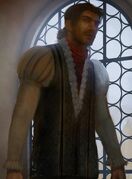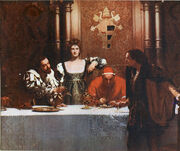(Sure, "the Younger"...) Tag: rte-source |
Tag: rte-source |
||
| Line 47: | Line 47: | ||
<gallery captionalign="center" position="center" spacing="small" widths="180"> |
<gallery captionalign="center" position="center" spacing="small" widths="180"> |
||
Gallery3.jpg|Rodrigo Borgia |
Gallery3.jpg|Rodrigo Borgia |
||
| ⚫ | |||
Juan Borgia the Younger.png|Juan Borgia the Younger |
Juan Borgia the Younger.png|Juan Borgia the Younger |
||
Gallery7.jpg|Cesare Borgia |
Gallery7.jpg|Cesare Borgia |
||
Gallery5.jpg|Lucrezia Borgia |
Gallery5.jpg|Lucrezia Borgia |
||
| ⚫ | |||
GiovanniBorgia.jpg|Giovanni Borgia |
GiovanniBorgia.jpg|Giovanni Borgia |
||
A Glass of Wine with Caesar Borgia - John Collier.jpg|''A Glass of Wine with Caesar Borgia'' by {{Wiki|John Collier (painter)|John Collier}} |
A Glass of Wine with Caesar Borgia - John Collier.jpg|''A Glass of Wine with Caesar Borgia'' by {{Wiki|John Collier (painter)|John Collier}} |
||
Revision as of 13:36, 11 May 2017
The House of Borgia, or Borja, was a Spanish-Italian noble family that became prominent during the Renaissance, and were the most impressionable embodiment of the Templars – and also the Order's leaders. Notable members include Rodrigo, Cesare and Lucrezia Borgia, and the family is known in modern times for their corrupt practices. In 1492, with Rodrigo Borgia's election as Pope, the family became the ruling body of the Papal state. As a result, the city of Rome declined into corruption, theft, murder and oppression.
Especially during the reign of Alexander VI, the Borgia family was suspected of many crimes, including adultery, simony, theft, bribery, incest, and murder – especially by arsenic poisoning. Because of their constant grasp for power, the Borgia made enemies of the Medici, the Sforza, and the Dominican friar Girolamo Savonarola, among others. Despite this, they were also patrons of the arts who contributed to the Renaissance.
Ezio Auditore da Firenze became a steadfast resistance against the Borgia in the early 16th century, and recruited citizens to the Assassin Order's cause. As the power of the Borgias declined into disarray, the city of Rome experienced a change, in that the benefits of art and culture finally arrived and its people discovered the prosperity of the Renaissance.
In 1503, with the murder of Rodrigo Borgia – courtesy of his son, Cesare – the Borgia family took an instant downfall, and Cesare, the Captain General of the Papal armies, was arrested and exiled to Spain in 1504. Subsequently, the family lost all of its influence upon the death of Rodrigo, after Pius III and later Julius II succeeded him as Pope.
Notable members
- Rodrigo Borgia
- Juan Borgia the Younger
- Cesare Borgia
- Lucrezia Borgia
- Jofré Borgia
- Giovanni Borgia
- Juan Borgia the Elder
- Battista Borgia
- Francisco de Borja
Family tree
| Jofré Llançol i Escrivá | Isabel de Borja | ||||||||||||||||||||||||||||||||||||||||||||||||||
| Rodrigo Borgia | Vannozza dei Cattanei | ||||||||||||||||||||||||||||||||||||||||||||||||||
| Juan Borgia the Younger | Cesare Borgia | Lucrezia Borgia | Perotto Calderon | Jofré Borgia | |||||||||||||||||||||||||||||||||||||||||||||||
| Giovanni Borgia | Maria Amiel | ||||||||||||||||||||||||||||||||||||||||||||||||||



